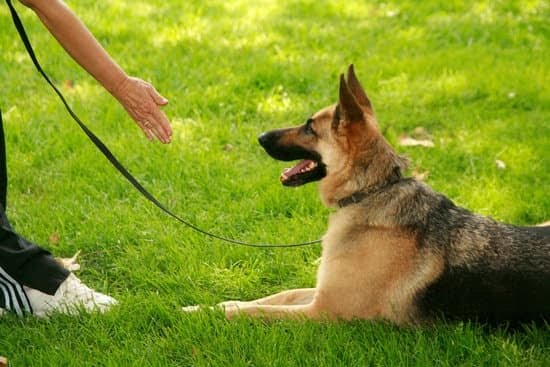How Do I Train A Dog To Stop Barking
?
Barking is a natural behavior for dogs, and most will bark at some point in their lives. There are many reasons why dogs bark, and understanding why your dog is barking is the first step to stopping the behavior.
There are many methods for stopping a dog from barking, but the most important part is to be consistent with whatever method you choose. If you are able to identify the reason your dog is barking, you can begin to address the behavior.
Some common reasons dogs bark include:
• When they are bored
• When they are anxious or fearful
• When they are trying to get attention
• When they are overexcited
If your dog is barking for one of these reasons, there are some things you can do to help stop the behavior.
If your dog is barking out of boredom, you can provide them with more stimulation, such as playing fetch or taking them for walks. If your dog is barking because they are anxious or fearful, you can work on helping them become more confident by providing them with positive reinforcement. If your dog is barking for attention, you can ignore them or give them a time-out. And if your dog is barking out of excitement, you can try to distract them with a toy or treat.
It is important to be patient and consistent when trying to train a dog to stop barking. If you are not able to address the behavior yourself, it is best to seek help from a professional dog trainer.
How To Train Your Dog Not To Bark Outside
There are a few easy things you can do to help train your dog not to bark outside. One is to make sure your dog has a good amount of exercise. A tired dog is less likely to bark. You can also work on basic obedience commands with your dog, such as “sit” and “stay.” If your dog knows how to obey these commands, he will be less likely to bark when he’s outside. Finally, be sure to praise your dog when he does not bark, and provide a treat as a reward.
How To Train Your Service Dog Not To Bark
Service dogs play a vital role in the lives of their owners, providing assistance with everything from opening doors to retrieving items from high shelves. However, one of the most common issues service dog owners face is dealing with a dog that barks excessively.
Barking is a natural behavior for dogs, and most will bark at some point in their lives. However, when a dog barks excessively, it can be a nuisance for both the dog and its owner. Excessive barking can also be a sign that the dog is not well-trained or is not comfortable in its environment.
If your service dog is barking excessively, there are a few things you can do to help train it not to bark. The first step is to determine why the dog is barking. Is it trying to get attention, asking to be let outside, or alerting you to a potential danger? Once you have determined the reason for the barking, you can start to address the issue.
If your service dog is barking for attention, provide it with plenty of positive reinforcement when it is quiet. This could include treats, petting, or verbal praise. If the dog is barking to be let outside, make sure to take it outside regularly and provide plenty of exercise. If the dog is barking because it is uncomfortable or scared, you may need to work on obedience training to help it feel more confident in its environment.
There is no one-size-fits-all solution to excessive barking, but by understanding why your dog is barking and addressing the issue accordingly, you can help train your service dog not to bark.
How To Train Your Dog Not To Bark On Walks
If you’ve ever taken a walk with a dog that barks incessantly, you know how frustrating it can be. Not only is the barking annoying, but it can also be dangerous if it’s preventing you from being able to hear traffic or pedestrians. Teaching your dog not to bark on walks is a fairly easy process, but it will require some patience and consistency.
The first step is to identify why your dog is barking. There are a number of reasons why dogs might bark on walks, including excitement, fear, boredom, and territoriality. Once you’ve identified the reason for the barking, you can begin to work on correcting it.
If your dog is barking out of excitement, the best way to correct it is to ignore the behavior. When your dog starts to bark, turn around and walk in the opposite direction. Only give him attention when he’s calm and quiet.
If your dog is barking out of fear, you’ll need to start by teaching him to be more confident. You can do this by rewarding him for calm behavior and gradually exposing him to more and more challenging situations. Once he’s feeling more confident, you can start working on correcting the barking behavior.
If your dog is barking out of boredom, you’ll need to provide him with more stimulation. This might mean taking him on more walks, playing more games with him, or giving him more toys to play with.
If your dog is barking out of territoriality, you’ll need to work on teaching him to be more social. You can do this by introducing him to new people and dogs, and rewarding him for calm behavior.
It’s important to be patient and consistent when training your dog not to bark on walks. If you’re patient and consistent, you’ll be able to help your dog overcome this annoying behavior.
How To Train A Dog Not To Bark So Much
It can be quite frustrating when you have a dog that barks incessantly. Not only is it annoying, but it can also be quite loud. In order to train your dog not to bark so much, you will need to be consistent and patient.
The first step is to determine why your dog is barking. Some common reasons include boredom, excitement, fear, and aggression. Once you have determined the reason, you can begin to work on solving the problem.
If your dog is barking out of boredom, you will need to provide him with plenty of exercise and stimulation. This may include taking him for walks, playing fetch, or giving him a puzzle toy to play with.
If your dog is barking out of excitement, you will need to teach him to calm down. One way to do this is to use a command such as “quiet” or “settle.” When your dog is calm, reward him with a treat or petting.
If your dog is barking out of fear or aggression, you will need to work on behavior modification. This may include positive reinforcement, such as treats or praise, or it may involve using aversive methods, such as shock collars or citronella collars.
It is important to be consistent with your training and to be patient. It may take a while for your dog to stop barking altogether. However, with patience and perseverance, you can train your dog to bark less.

Welcome to the blog! I am a professional dog trainer and have been working with dogs for many years. In this blog, I will be discussing various topics related to dog training, including tips, tricks, and advice. I hope you find this information helpful and informative. Thanks for reading!





